Fermenting chicken feed – The definitive guide

What does it mean to ferment chicken feed? How important is it? Here’s a definitive guide on all you need to know about fermenting chicken feed.
In this article, we have answered all the questions that plague your mind about this concept.
If you’re ready to find out, I am as well.
Welcome aboard, farmer!!!
What is feed fermentation?
Feed fermentation is an enzyme-catalyzed anaerobic breakdown of feed by the action of bacteria in a controlled environment.
It’s a naturally occurring process that man can induce.
Some refer to feed fermentation as Lacto fermentation.
This is so because lactobacillus: a Lacto bacteria that ferments chicken feeds.
These bacteria convert starch and sugar in the feed into lactic acid bacteria (LAB).
From this, natural probiotics are formed, which lowers pH, and prevents the growth of harmful bacteria in the feed.
Most farmers employ this technique when they want to increase the number of eggs a chicken lays in a week.
Why should I ferment chicken feed?
In simple terms, fermenting chicken feed is a way of having healthier chickens yet having low feed consumption.
It’s an inexpensive way to improve the nutritional value of basic dry feed while also consuming less of it.
Your chickens get to be robust regardless of their make.
Fermented chicken feed packs a long list of health benefits.
You will find out more about it below.
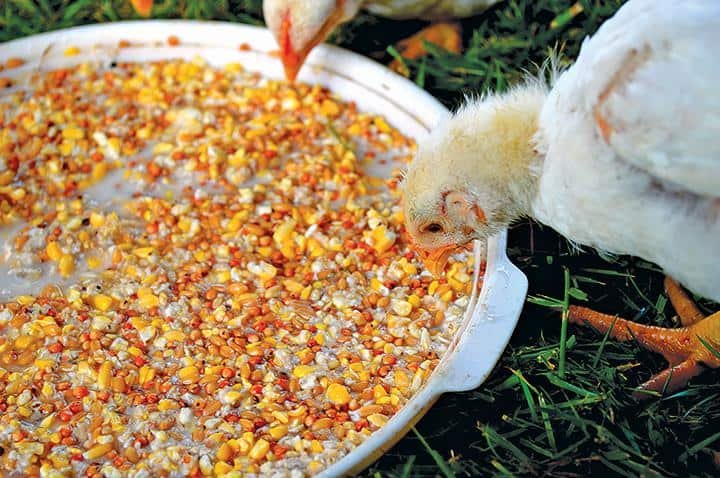
What are the health benefits of fermenting chicken feed?
If a fermented chicken feed is as good as we have said, what should you expect?
Do these feeds make the birds healthy?
If yes, how?
Well, one reason you should give your chickens fermented feeds is because of its health benefits.
Below, you will find out the health benefits of fermented chicken feed;
1. Increases digestion and nutrient absorption:
Feeds naturally come dry and hard.
When soaked, they become softened and gentle on the stomach.
This makes it easier for the chickens to digest it.
2. It reduces phytic acid content in the feed:
All chicken feeds contain phytic acid. It’s also present in grains, seeds, nuts, beans and other legumes.
What is that? And why does it matter?
Phytic acid is referred to by many as an “anti-nutrient”.
However, biologically, phytic acid is an enzyme inhibitor.
It naturally impairs the absorption of certain nutrients and minerals.
When feeds are fermented, it vastly reduces the phytic acid content.
This, in turn, makes it easier for chickens to use all the good nutrients they’re consuming!
3. Also, fermenting chicken feeds enhances the vitamin content of feeds:
This stands true mostly for vitamin B.
Fermentation of chicken feeds enhances the content of vitamin B.
4. Fermentation adds probiotics to feeds which boost chicken immunity:
As lactic acid bacteria work on the chicken feed, other beneficial bacteria grow in it.
The resulting probiotics are stellar for immunity, digestion, and improved gut health.
And generally, gut health is directly proportional to total body health.
Also, according to a study, chickens that constantly feed on probiotics have a more robust immune system when compared to other chickens who feed on standard dry feed diets.
5. Fermenting chicken feed lowers the intestinal pH of chickens:
And how does this contribute to health?
Well, it does.
The lactic acid bacteria present in fermented chicken feed lower the intestinal pH.
This in turn wards off acid-sensitive bacteria like E.Coli and Salmonella.
The absence of these bacteria means that the chicken will likely not develop infections and other diseases.
Therefore, they will live longer and have less complicated lives.
And on your part, that’s less stress, vet bills, and healthier eggs!
6. Fermented feed = better quality eggs:
We found out from a study that chickens fed with fermented chicken feed had an increased egg weight.
Also, the eggshell was very thick.
This is beneficial because the chickens will not have to worry about having soft shell eggs or suffering egg-bound.
Both case scenarios can be life-threatening!
Remember, garbage in, garbage out. Whatever goes into the chickens comes out in their eggs.
Since fermented feeds are nutritious, the eggs will be supremely nutritious and tasty.
Actually, this is a remedy for chickens that lay small eggs like the Serama chickens.
7. Fermented feed = robust birds:
These feeds make the chickens add weight.
And if your chickens are for sale, this is a technique to fatten them up.
It’s also a viable option for fat chickens such as Frizzle chickens.
But it can cause chickens such as Australorp and Cochin Chickens to get overweight.
What are the disadvantages of fermenting chicken feed?
There’s no doubt that fermenting your chicken feed comes with a lot of advantages.
But on the flip side, there are some considerations you need to know.
Below, you will find out why fermenting your chicken feed might not be a good idea;
1. Fermenting the chicken feed can be time consuming:
This process, though easy, can be time-consuming.
It’s absolutely easy for people with less flock.
Just imagine fermenting feed that will be enough for 500 birds.
That’s a lot of work and time!!!
2. Although it saves feed cost, it’s not that much.
The fact is you only get a 10% reduction in the chicken feed bill when fermenting.
3. It’s absolutely not good for chicks.
According to a study by J.A. Missotten, J. Michiels, N. Dierick, A. Ovyn, A. Akbarian & S. De Smet in 2013 (Effect of fermented moist feed on performance, gut bacteria and gut histo-morphology in broilers), they discovered that fermented moist feed was detrimental to early bird growth.
4. Fermented feeds can promote chicken cannibalism:
Weird!!!
A study by Dr R.M. Engberg , M. Hammersh⊘j, N.F. Johansen, M.S. Abousekken, S. Steenfeldt and B.B. Jensen in 2009 (Fermented feed for laying hens: effects on egg production, egg quality, plumage condition and composition and activity of the intestinal microflora) showed that fermented feeds caused chickens to be more aggressive.
This made them peck and eat each other.
We might relate this to the alcohol content from the fermentation process.
5. Certainly, fermented feed leads to wet litter:
Cleaning the pen will become an arduous task.
Also, this can cause aspergillosis, hock burn and fungus growth.
6. Fermenting feeds can lead to wastage:
Because they do not last long, it can lead to wastage if the chickens eat little.
It’s good you count the cost and see if fermenting chicken feed is worth it.

How to make fermented chicken feed
Having known how important fermenting chicken feed is, it would be outrageous not to try it out.
How do I do that?
Below you will find a definitive guide on fermenting chicken feed;
1. Create a controlled environment:
Here’s the first thing you should do, create a controlled environment.
In simple terms, find a suitable container to ferment the chicken feed.
2. Mix feed and dechlorinated water:
The next thing to do is to add the quantity of feed you need to ferment in the container.
As earlier stated, it should just be the quantity they can finish in at least 2 days.
Then, pour enough dechlorinated water over the top of the feed.
Ensure the feed is submerged into the water.
Also, give a little more room for expansion.
3. Let the feed ferment:
Cover the container with a loose-fitting plate, lid, or other makeshift lids.
It does not have to be airtight.
All you just want to do is allow the fermentation gases to float out and prevent other bacteria or drifting mold spores from floating in.
Ensure the container is in a location with moderate temperatures.
Leave it for three to four days to ferment. Ensure you stir it each day.
If the feed has absorbed all the water, you can add additional water.
By day 2 or 3, small bubbles will form on the surface and/or within the feed mixture.
This means that the lactobacillus is acting on the feed and fermentation is taking place.
You notice that the liquid will get cloudy.
With these pointers, you know that the chicken feed is undergoing fermentation.
4. Drain and feed the flock:
It’s food time!!!
If the feed hasn’t absorbed all the dechlorinated water, you can filter it.
You can either throw the water away or keep it for the next fermentation.
This fermented filtered water can actually put the next batch about a day ahead of schedule.
And speaking of schedules, you can start fermenting the chicken feed immediately.
This is to ensure that there is no gap in feeding the flocks with fermented feed.
Unless that’s what you planned.
Once you have filtered the feed, you can feed the flocks with it.
Note:
The fermenting chicken feed should smell slightly tangy, sour, and sweet.
Its smell should be like yoghurt or yeast.
If it develops mold or putrid odours, do not feed it to them!
Frequently asked questions on fermenting chicken feed.
How often do I feed my chickens fermented feed?
Fact is, there is no “overdoing it”.
You can feed the flock every day with fermented chicken feed.
Or you can place them on a plan.
Chickens like the Australorp, Cochin and other heavyweight birds need to have a plan.
Else they get overweight. And that’s not good!!!
When should I ferment the feed?
As readily as possible.
Unless the chickens are on a diet plan, you can soak the next batch immediately if you filter the last one.
When the chickens are molting, stressed, or seem a little under the weather, it’s best to keep the fermented feed in ample supply!
The fact is, they need all the extra nutritional support they can get during those times.
Is fermenting a chicken feed a simple task?
Of course! It’s a no-stress process.
It’s very simple, effective, and worthwhile!
And because it helps the chickens in every way, there’s no hard work in it.
How long does it take to ferment a chicken feed?
Actually, it only takes a couple of minutes to make and a few days to soak.
Basically, it will take about 3 to 4 days for the chicken feed to fully ferment.
Where can I ferment chicken feed?
Fermenting chicken feeds requires a controlled environment.
Do not be scared by that big name.
A controlled environment can be as simple as a mason jar, bucket, or large glass bowl with water.
Not a five-star laboratory.
It’s best to choose glass, ceramic, or BPA-free plastic.
It should be large enough to hold feed that can last a day or two for your flock.
Also, it should have extra room for water, stirring, and expansion.
What kind of chicken feed can be fermented?
All kinds of chicken feed can be fermented. This includes;
- Crumble.
- Pellets.
- Whole grain chicken feed.
- Treats.
- Corn.
Should I ferment my chicken feed?
Yes, you should.
It’s healthy and an inexpensive way to fatten your birds.
Also, it can help boost the bird’s immunity. This means you have fewer health issues to worry about.
Does fermenting chicken feed save money?
Yes, it does.
Birds eat a more soaked feed compared to dry feed.
This will mean you get to save costs while achieving more results with fermented feed.
Just keep in mind it’s not that much you get to save.
How long does fermented feed last?
Basically, four days max.
Anything longer than that will make the feed sour and produce a tangy smell.
That is definitely not good for the chickens.
How do you increase egg production in chickens?
To increase egg production, you need to be sure you’re not expecting much from a chicken which by nature doesn’t lay many eggs.
But if that’s not the case, fermenting the chicken feed is one way to increase how many eggs a chicken lays in a week.
What are the benefits of fermenting chicken feed?
In summary, here are the benefits of fermenting chicken feed; it’s
- Economical.
- Healthy.
- Fattens the birds.
- Also, it produces big sized nutritious eggs.
- Boosts the immune system of the birds.
- Also, the birds love fermented chicken feed best.
Why should I use dechlorinated water when fermenting chicken feed?
Fermenting chicken feed requires the use of dechlorinated water.
This is so because chlorinated water may inhibit healthy fermentation.
You can either buy dechlorinated water or simply leave tap water out at room temperature overnight to allow the chlorine to dissipate.
Or you can use filtered water.
How do I preserve a fermented chicken feed?
Although the feed will be safe without proper preservation for at least 3 days, it can get sour with time.
Once it gets sour, it can become less palatable.
Therefore, you can either make the quantity that’s enough for a day or two or simply refrigerate.
How do I know if the fermented chicken feed has gone wrong?
Well, the signs will be crystal clear. Here’s what you will see and know that fermentation has gone wrong;
- It develops mould.
- Bad or off smell or putrid odours. Some describe as vomit smell.
- Funky colours. Cloudiness is expected, but odd or bright colours are a bad sign.
Conclusion: Fermenting chicken feed.
Fermenting the feed for your chicken can be worth the while.
However, it’s best if you find out if it is a path you will want to take.
We hope you found this piece interesting.
Do explore the site for more enlightening articles to help you have the best farm!!!
References
- 12 Best Chicken breeds for Eggs – chicken breeds for eggs
- When Do Chickens Start Laying Eggs Regularly?
- How Many Eggs Does A Chicken Lay In A Week?
- Fermenting chicken feed – The definitive guide
- 10 Sure Ways To Stop Chickens from Eating Their Eggs [+Bonus]
- 6 Best Chicken Egg Incubators for Chicken Eggs and Other Birds
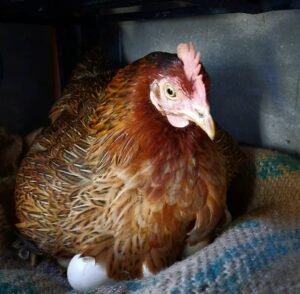
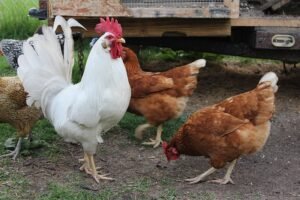
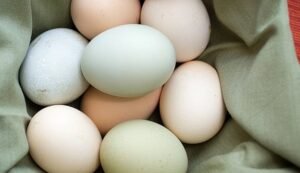
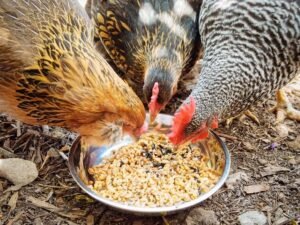
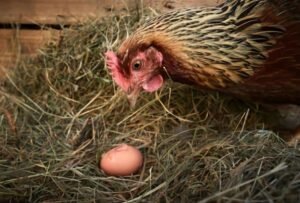


![11 Heritage Turkey Breeds [With Pictures]](https://agro4africa.com/wp-content/uploads/2021/08/Bourbon-Red-Turkey_1-e1640285809670.jpg)

![How to Take Care of Chickens [Beginners guide]](https://agro4africa.com/wp-content/uploads/2020/10/How-to-care-for-chickens.jpeg)


Thanks so much for this lecture,is very interesting,I will start practicing feed fermentation,thanks
You are welcome, Joy.
I look forward to sharing your result.